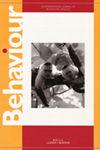占支配地位的竞争者对宿主蚂蚁对奴隶制造者的攻击性的影响
IF 1
4区 生物学
Q4 BEHAVIORAL SCIENCES
引用次数: 0
摘要
造奴蚁可能通过掠夺宿主蚁巢,有时甚至摧毁整个蚁群,对宿主种群施加强大的压力。因此,寄主蚂蚁已经进化出许多适应能力,以减少被攻击的可能性,抵抗攻击,或者作为最后一道防线,最大限度地减少与奴隶制造者成功入侵相关的损失。这篇论文介绍了对一种常见的古北蚂蚁物种福米卡的研究结果,福米卡是由同属的F. sanguinea组织的奴隶袭击的受害者。造奴蚁被安置在靠近宿主蚁巢入口的地方,随后的攻击行为被记录下来。该研究是在优势竞争对手的影响下进行的,通过选择位于木蚁(F. rufa和F. polyctena)领地内外的寄主殖民地。这种方法使得在相互生态互动中扮演不同角色的三个物种之间潜在的共同进化相互作用成为可能。F. fusca蚂蚁对制造奴隶的蚂蚁有攻击性反应,但对占主导地位的竞争对手没有。此外,宿主蚂蚁避免对木蚁的攻击,除了可能遗传的因素外,还需要环境诱导的因素。占主导地位的竞争对手作为领土所有者的影响表现在f.f asca蚂蚁保护其殖民地免受奴隶制造者侵害的速度降低。结果表明,这种影响是由木蚁对fusca蚁群大小的负面影响介导的。本文章由计算机程序翻译,如有差异,请以英文原文为准。
Impact of the dominant competitor on the aggressiveness of host ants toward slave-makers
Abstract Slave-making ants might exert strong pressure on their host populations by pillaging their nests and sometimes destroying the whole colonies. Consequently, host ants have evolved many adaptations reducing the probability of being attacked, resisting an assault or, as a last line of defence, minimising the losses associated with a successful slave-maker invasion. This paper presents the results of a study on a common Palearctic ant species, Formica fusca , which falls victim to slave raids organised by the congeneric F. sanguinea . Slave-making ants were placed close to the nest entrance of the host ants, and the subsequent instances of aggression were recorded. The study was carried out in the context of the influence of the dominant competitor by selecting host colonies located within and outside the territory of the wood ants ( F. rufa and F. polyctena ). This approach enabled the potential co-evolutionary interplay among three species performing different roles in mutual ecological interactions. The F. fusca ants reacted with aggression to the slave-making ants but not to the dominant competitors. Moreover, the avoidance of the aggression of host ants toward wood ants entails an environment-induced component, besides the presumably inherited one. The impact of the dominant competitor as a territory holder manifests itself in the reduced promptness of F. fusca ants to defend their colonies against slave-makers. The results suggest that this effect is mediated by the negative impact of wood ants on F. fusca colony size.
求助全文
通过发布文献求助,成功后即可免费获取论文全文。
去求助
来源期刊

Behaviour
生物-动物学
CiteScore
1.80
自引率
7.70%
发文量
44
审稿时长
3 months
期刊介绍:
Behaviour is interested in all aspects of animal (including human) behaviour, from ecology and physiology to learning, cognition, and neuroscience. Evolutionary approaches, which concern themselves with the advantages of behaviour or capacities for the organism and its reproduction, receive much attention both at a theoretical level and as it relates to specific behavior.
 求助内容:
求助内容: 应助结果提醒方式:
应助结果提醒方式:


